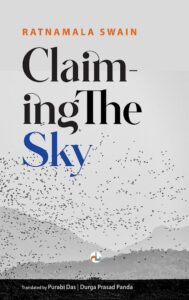BOOK REVIEW BY OUDARJYA PRAMANIK
Poems work as a medium of communication through written words. Thus, a poem is the product of expressing the emotions of the poet that are shared among the readers. Ratnamala Swain, a popular industrialist and poet, states that poems are nothing different from the music of her soul. Her poems come out naturally amid her work life.
The book ‘Claiming the Sky’ is a collection of forty (40) poems that cover broadly the groove of a middle-class woman’s life. The book focuses on the passing thoughts and minute details of everyday life in the 21st century, more specifically the daily life of a woman in the post-pandemic era.
The title of the book, ‘Claiming the Sky’ signifies the mere expectations of the poet and the reflection that draws upon the poet’s desire to claim the sky, but “Our dreams are perfect in the picture frame, but when reality strikes, I look into the spreadsheet of profit and loss. The land here is dirt cheap”.
The first poem of the collection, ‘Daughter: Online‘, shows that the poet confesses the common human psychology of dwelling in the past. It is generally believed that childhood is the best phase of life. Once childhood is gone, the race of money, greed, and power engulf us, and thus a void or emptiness also spheres up.
“My daughter is always online.
And I, offline”
The word ‘offline’ doesn’t describe social media offline, but the life of an adult.
If we just go through poems like ‘Home’ or ‘House in an Earthquake’, she depicts the actual truth of the Indian household, where the women are expected to do all the physical works of a family; they are looked upon as the carers in the patriarchal society, where they are only supposed to be the bread earners and the head of the family. Society expects women to leave their families to adapt to a new family overnight. But what if the woman does not adjust and sacrifices against the common practice, as they are often discriminated against in society? The man certainly becomes a vagabond.
The poet’s approach is similar in the The poet’s approach is similar in the poem “Palanka,” and here too the poet rebels for the women of society, who are hardly talked about.
Poems like ‘House’ search for love within their beloved. ‘Inactivity is active’ and ‘Sisyphus‘ draw on the brutal reality where men mostly dominate. Gender and domestic violence are two interrelated matters of societal relevance and urgency. She promotes the idea that she was not meant to be a servant of men. In the In the poem “Camel,” she denoted life as a game of finding clutches. Females belong to the most oppressed group in the world. She is a victim of cultures, structures, and institutions. She focuses on the monotonous work of the majority of housewives in the Indian subcontinent, where they find their backs loaded with endless dreams yet are forced to collapse unceremoniously.
“With the passage of time,
All the gold will turn into flecks of dust.”
Middle-class women are always fighting for independence; they are forced to follow a monotonous life where they merely act as a catalyst or foil to family work without expecting anything in return. Here, Ratnamala Swain depicts a lively picture where women want to do more, but access to credit is still missing.
“The fruits of the tree I had planted
With so much care
Were eaten by others.
The trees that I didn’t plant
Are laden with fruits
In the garden of my dreams
I eat them at night and vomit in the morning.”
A few of the poems in the collection deal with the memory of death and rebirth, the eternal truth of life. ‘Father’s Almirah’ and ‘Mother in My Heart’ are more about nostalgia. Through these poems, it is evident that she values her family. According to her, if a woman can adjust herself to her career, then she can do the same with her family too.
This collection of poems basically acts as a representation of Indian women, and Ratnamala Swain spoke on behalf of the oppressed gender in this world. The textbooks or journals won’t provide detailed evidence, but this collection of poems certainly does. These poems become the voice of the unspoken words that are not brought to light too often.
“Remember,
A woman
Being disrobed,
Turns into
A raging fireball,
While men are reduced
To a mound
Of ashes.”
Robert Frost once said, “Poetry is what gets lost in translation.” It is true that no two languages share identical context, but the translators, Purabi Das and Durga Prasad Panda, did the translations tremendously well, as the poems can be looked at as an independent literary text and the essence of the original poems is vividly illustrated. As Kaiser Haq too remarks, ‘The first thing that will strike readers of this collection is that the poems do not read like translations.’
Also read, The Dark Forest, a book review by Soham Guha and published in The Antonym:
Follow The Antonym’s Facebook page and Instagram account for more content and exciting updates.



























0 Comments